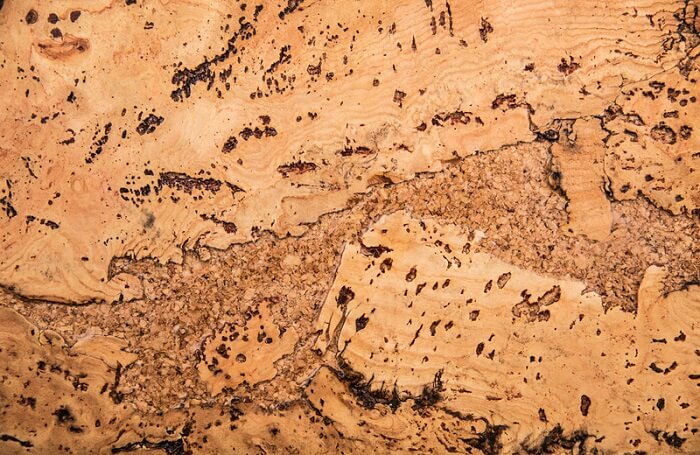Cork is a natural soundproofing material that is made from cork oak tree bark.
Cork gets its brilliant soundproofing properties from billions of tiny cells, 35 million per square centimeter, which trap layers of nitrogen and oxygen between them.
This gives cork a flexible membrane that is responsible for its characteristic bounce or elasticity which help it bock sounds.
Cork also contains a significant amount of fatty acids which help make it impermeable (ideal for bottle corks).
These properties combined mean that cork is one of the best soundproofing materials!
If you’re looking for some effective cork based soundproofing products try these:
Where Does Cork Come From?
Cork comes from the bark of the Cork Oak (Quercus Suber) tree. These trees grow extremely well in Mediterranean climates, so you can find plenty of them in countries such as Spain, Portugal, Morocco, France and Italy.

Here are a few facts about Cork Oak trees and their bark:
- They live over 200 years and many live as long as 300 years.
- It takes a minimum of 25 years for the tree to mature to a point where it can be harvested for cork.
- Their bark can be stripped for use every 9 years.
- Cork bark has to be stored outside for 6 months to dry out before it can be processed.
- 100kg of raw bark yields 62kg of usable cork planks.
- Cork is naturally resistant to rot, fire, termites and stains, it is also anti-microbial!
Read some more interesting facts about cork trees here!
Cork is completely sustainable and environmentally friendly as the trees do not need to be chopped down to harvest cork from them, rather their bark is peeled off and then the tree is left alone (for 9 years!) while it regrows.
Cork is harvested between May & August because it causes minimal damage to the tree as the bark separates more easily from the tree in the summer heat.
How Good Is Cork For Soundproofing?
Cork has natural sound inhibiting properties that allow it to reduce the amount of noise traveling through walls and floors.
Cork’s cellular structure mirrors that of a honeycomb, it is super lightweight and packed with air and with more than 35 million cells per square centimeter it makes a superb insulating material, ideal for soundproofing.

When an impact, such as someone walking on it or a soundwave, hits cork the air in the cork compresses acting like a cushion that absorbs and deadens the impact, meaning far less noise is created.
Just a 3mm layer of cork flooring could reduce sound by more than 10 decibels – this is much better than any comparable material can achieve!
To put a more exact number on how good cork is at soundproofing we can look at its Noise Reduction Coefficient score which is a measure (from 0 – 1) of how efficient a material is at sound absorption.
Cork has an impressive NRC score of 0.7 which means it absorbs 70% of noise and reflects 30%.
Ideally, any soundproofing product should have an NRC score of at least 0.4% to make a worthwhile impact – cork significantly exceeds this, so using cork in your soundproofing project is a smart move.
Cork Flooring
Cork enhances the warmth of a room while providing comfortable floor cushioning which dampens sounds, it is a great choice for rooms that are sound sensitive.
Cork flooring is commonly used in bathrooms and kitchens as an alternative to tiles or linoleum.
Cork Tiles For Soundproofing Walls
Cork tiles are great for adding an extra layer of sound insulation to stud walls or adding some heat insulation to a cold brick wall.
Vibrations that travel easily through a stud wall can be significantly dampened with the addition of a layer of cork tiles which will also give your room a warm rustic feel.
Cork tiling can also double as a handy pinboard, yet be aware that sticking pins into your cork may cause it to break up over time so it won’t last as long.
- Thickness: For applications requiring thickest cork
- Size: Covers 32 square feet
- Easy to Cut & Install – Mount directly to wall or glue to backer board; can be stained or painted
Ceilings & Cork
Cork is ideal for ceiling tiles for a number of reasons:
- It is a great insulator, not only does cork insulate well against sound but it is a great heat insulator too, using cork ceiling tiles will help keep the heat in your room while also stopping noise from leaving (or coming in).
- It is highly fire retardant – it won’t combust until temperatures reach around 390°F / 198°C and when it does combust it burns slowly and doesn’t release any toxic fumes meaning they comply with fire regulations.
- It is lightweight, ceiling tiles need to be lightweight so that your drop ceiling can bear the weight of them, also if a tile ever gets knocked down (kids playing football) you can be confident that the falling tile won’t do any serious damage to anything or anyone because it is not heavy.
Check them out here:
As an Amazon Associate I may earn a small fee from qualifying purchases at no extra cost to you. This helps us run the site, so thanks for your support!


